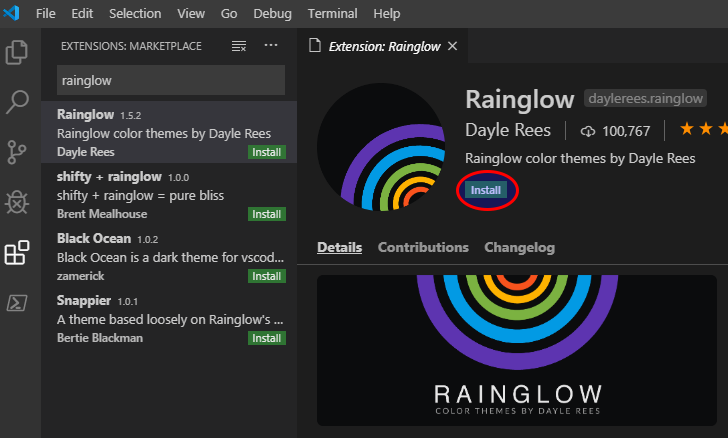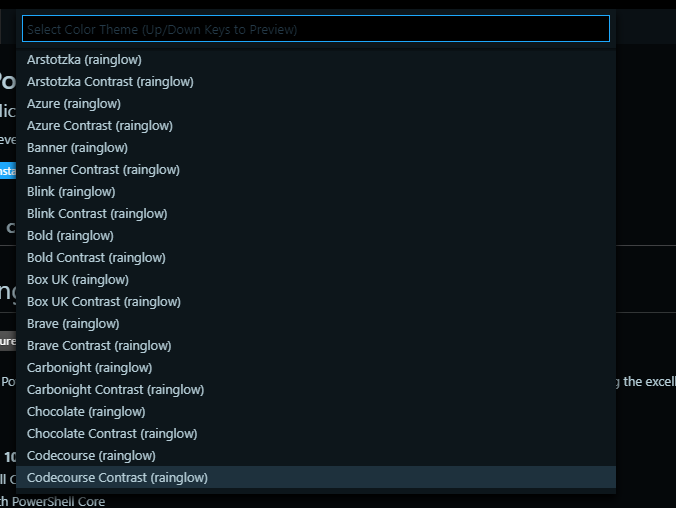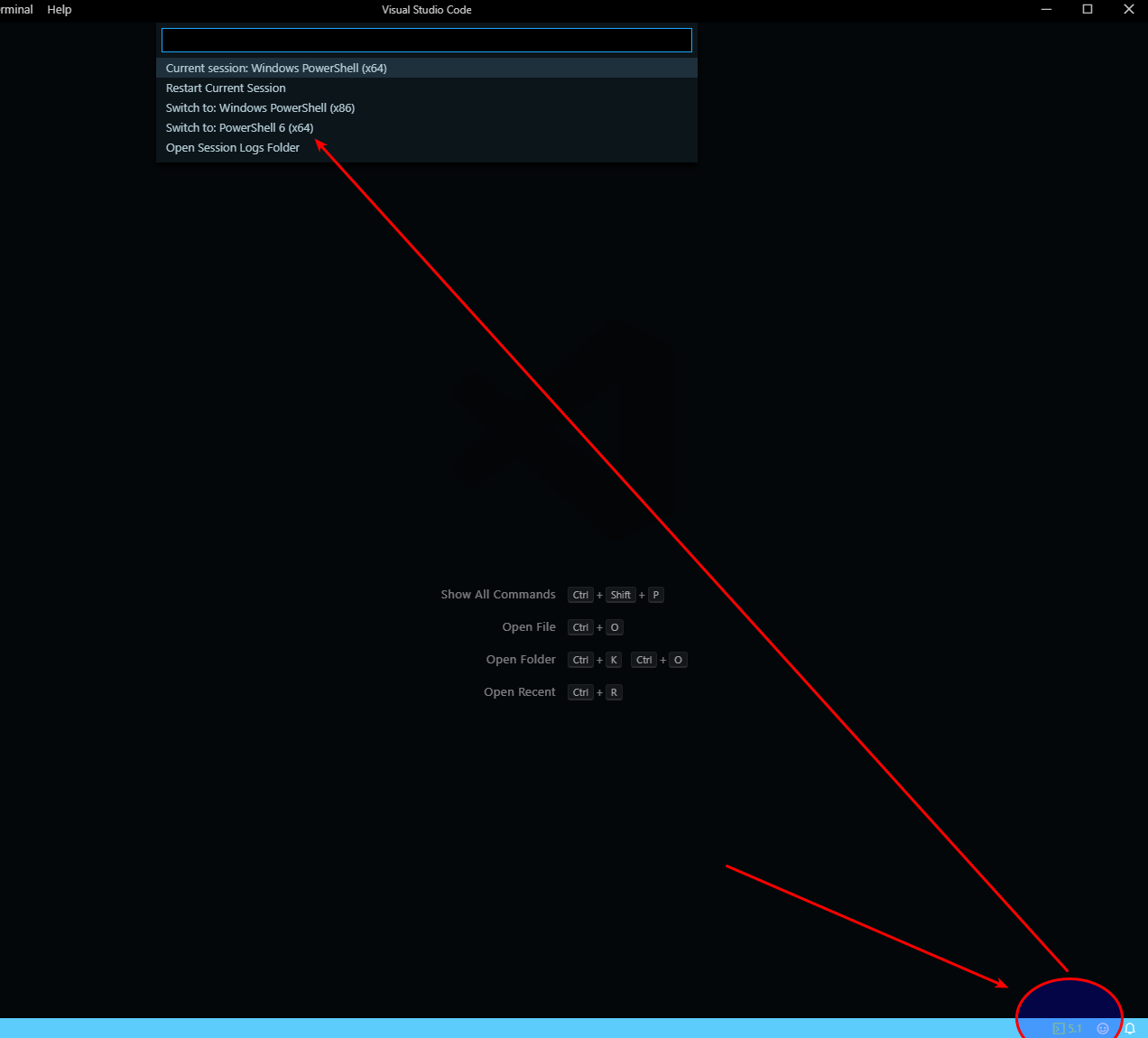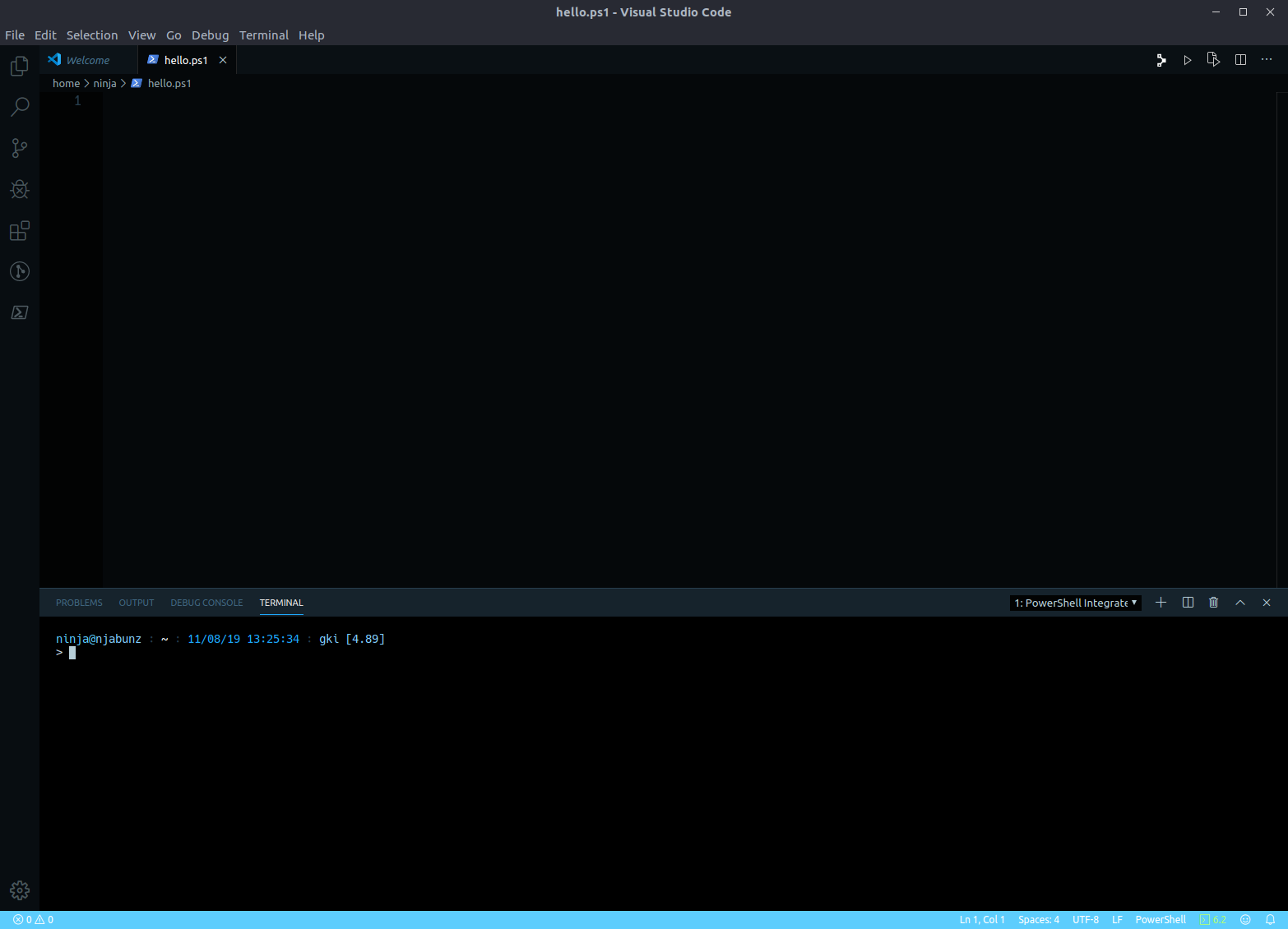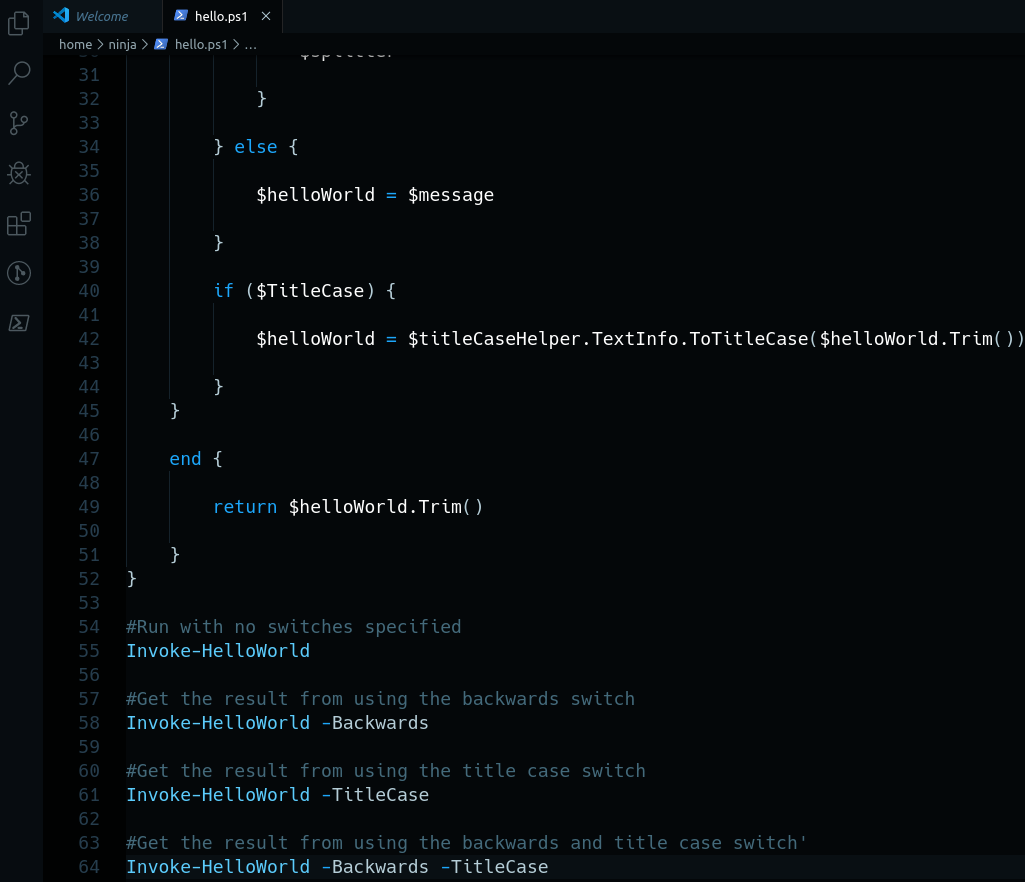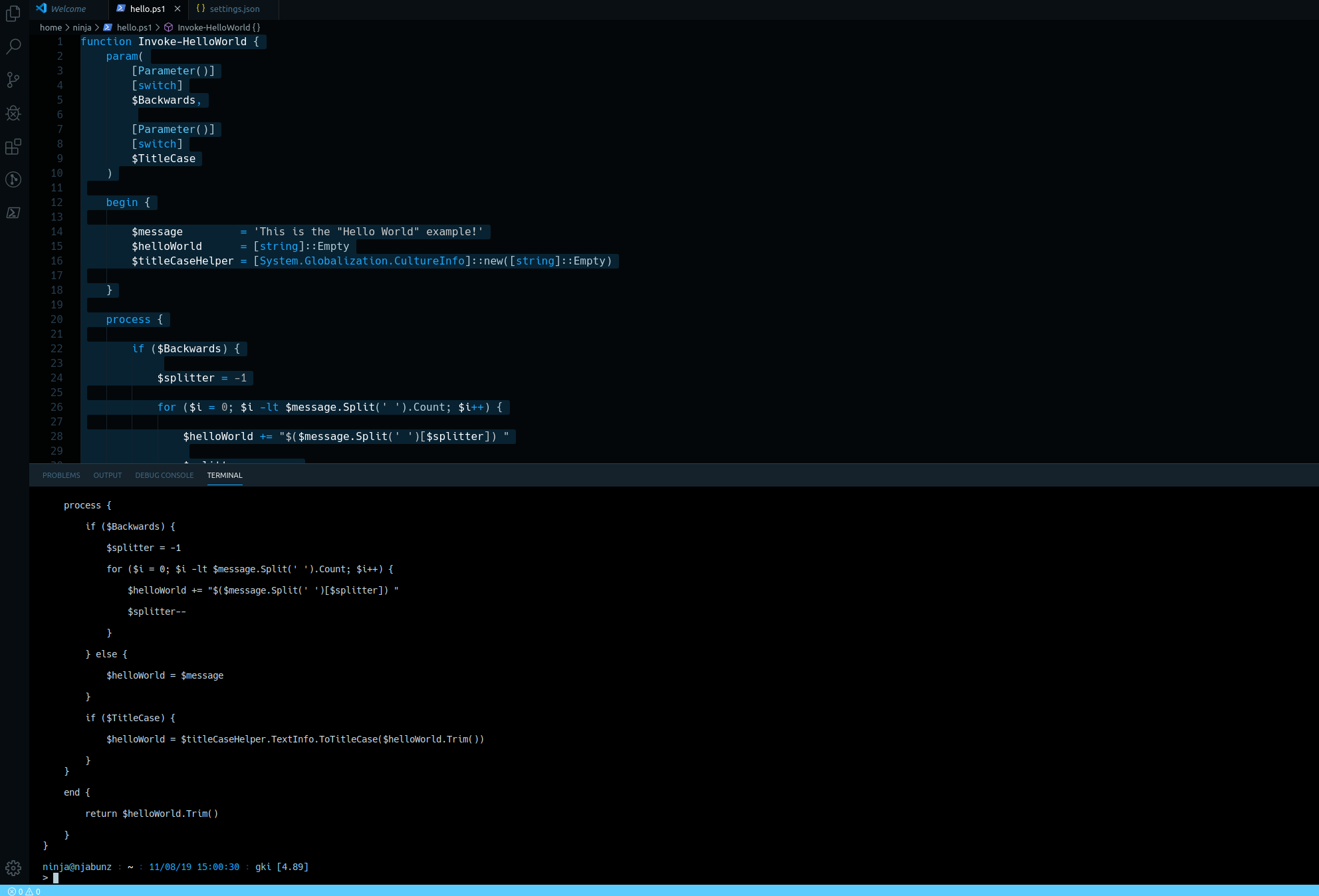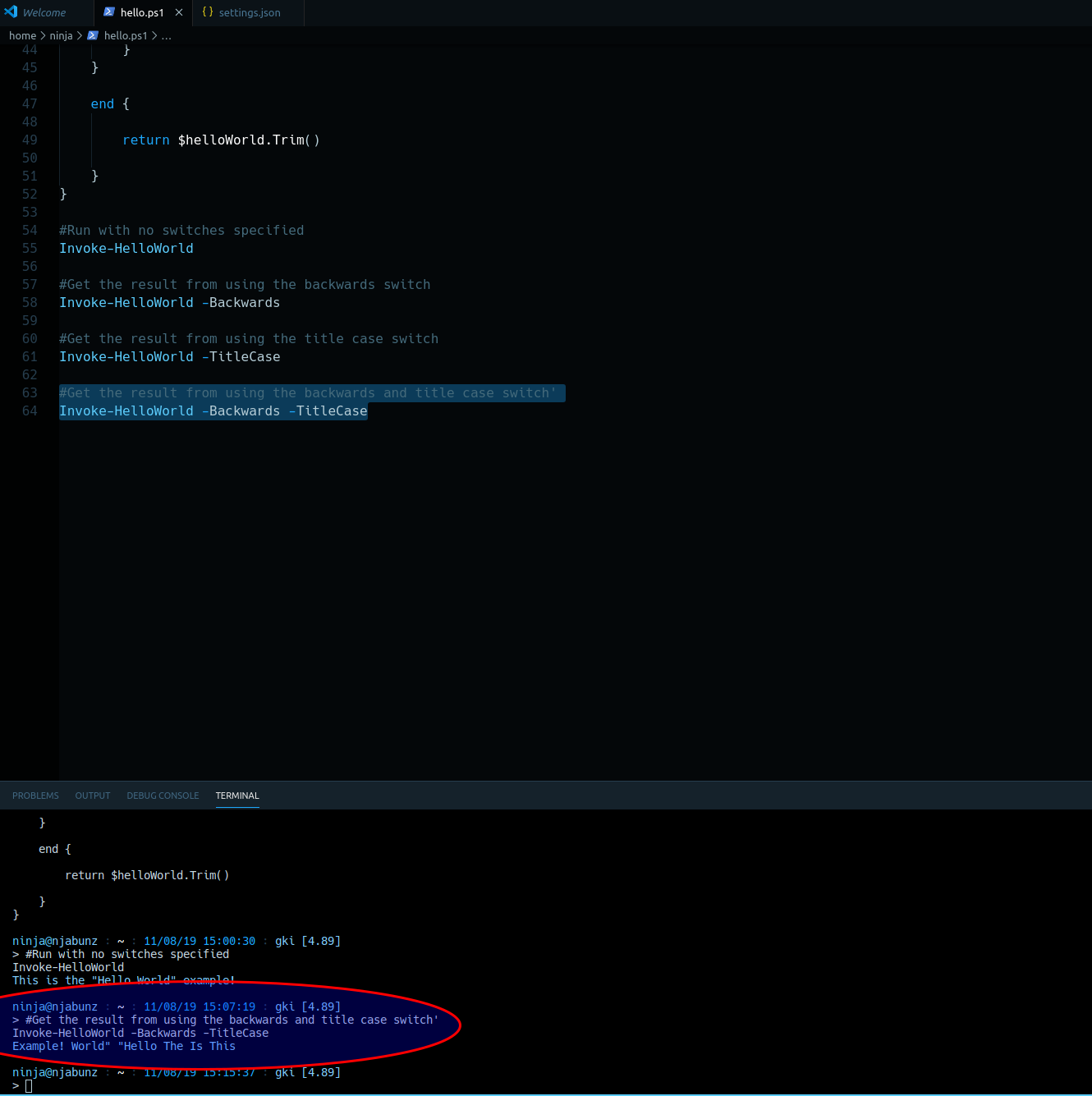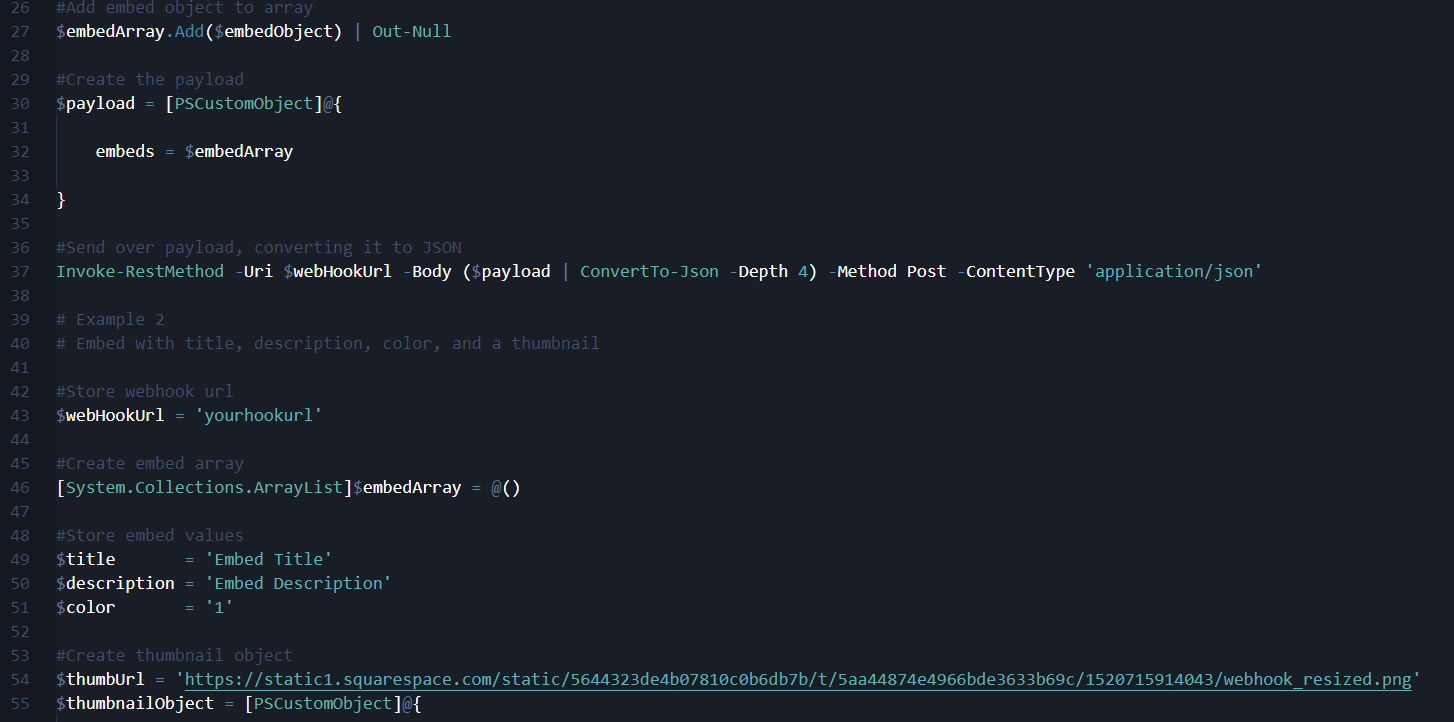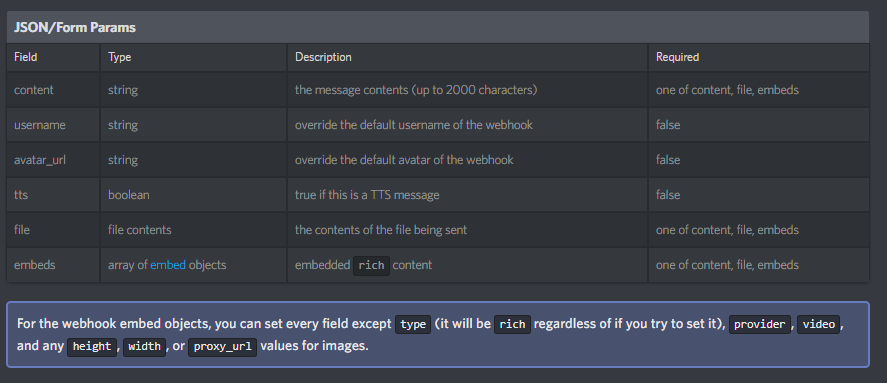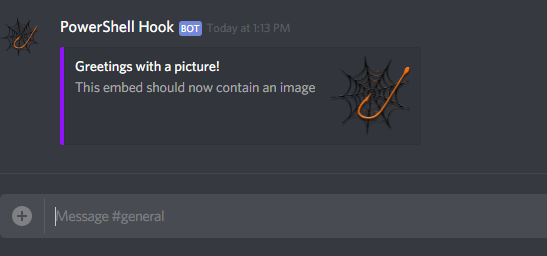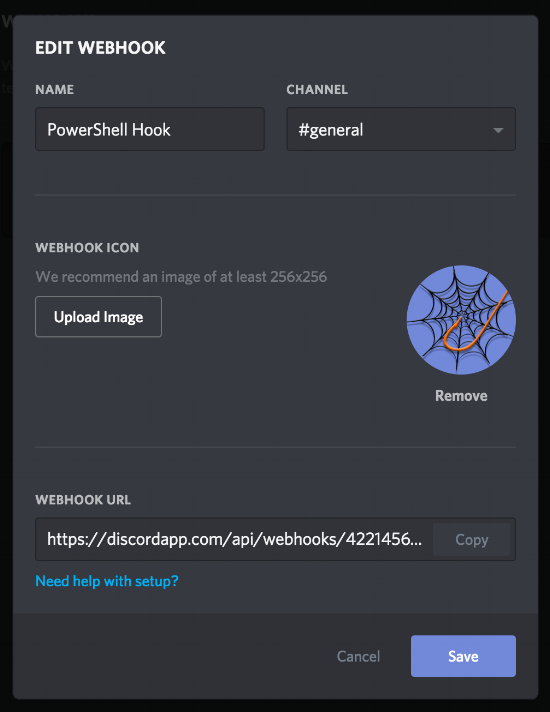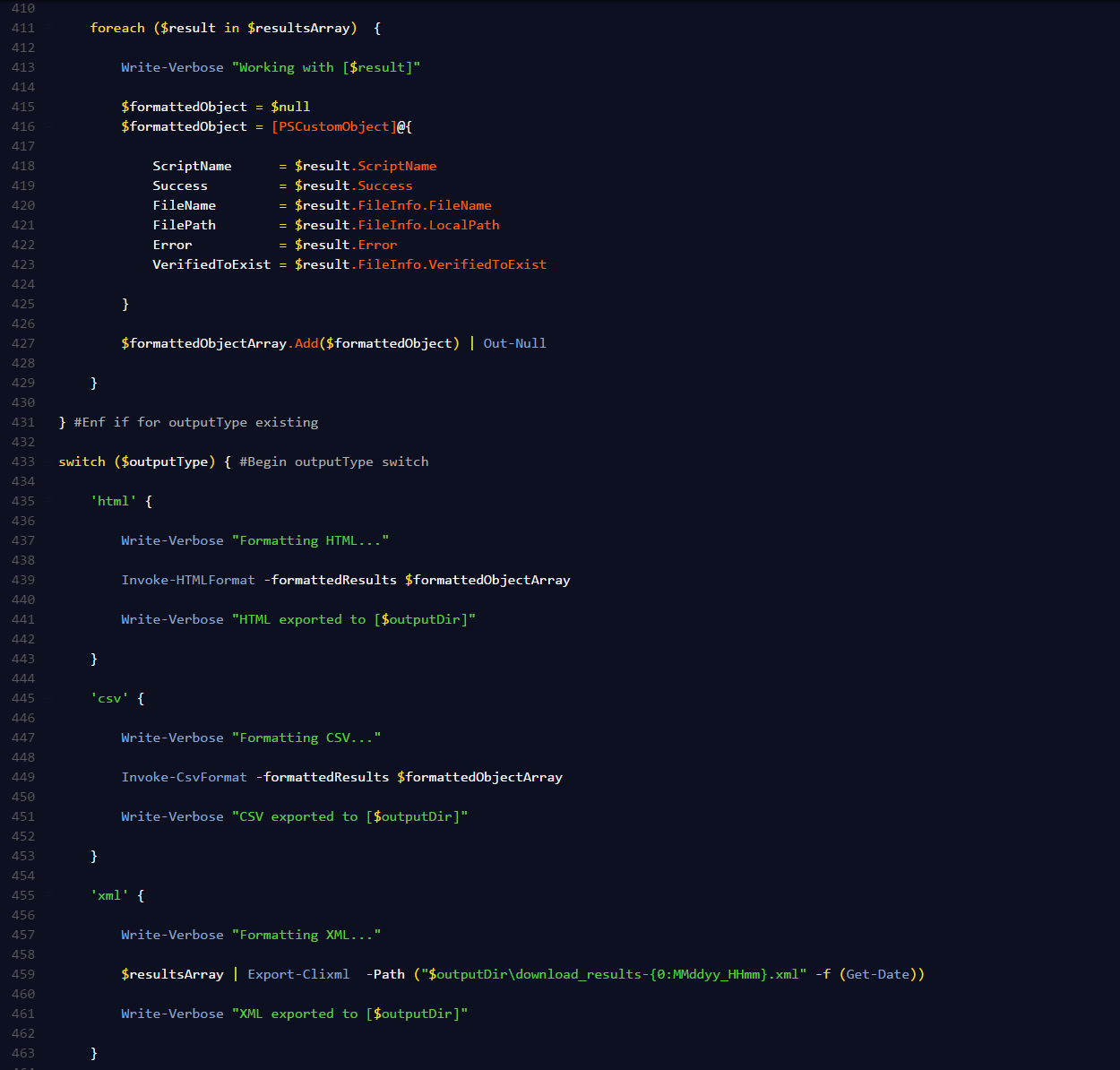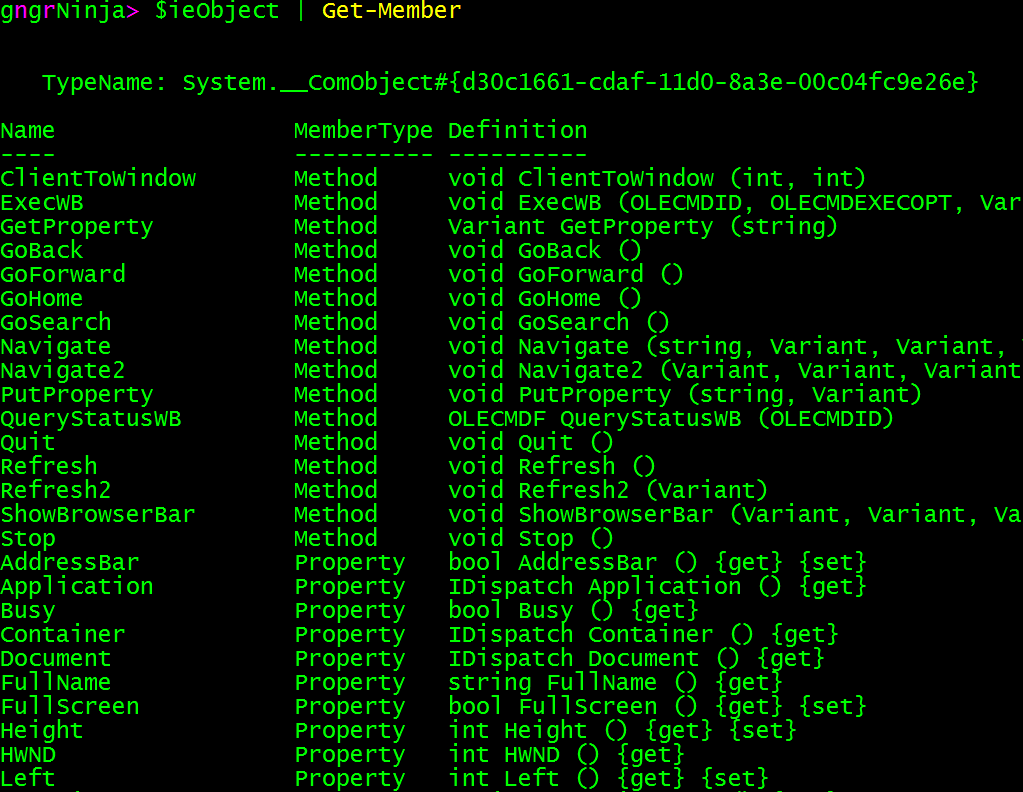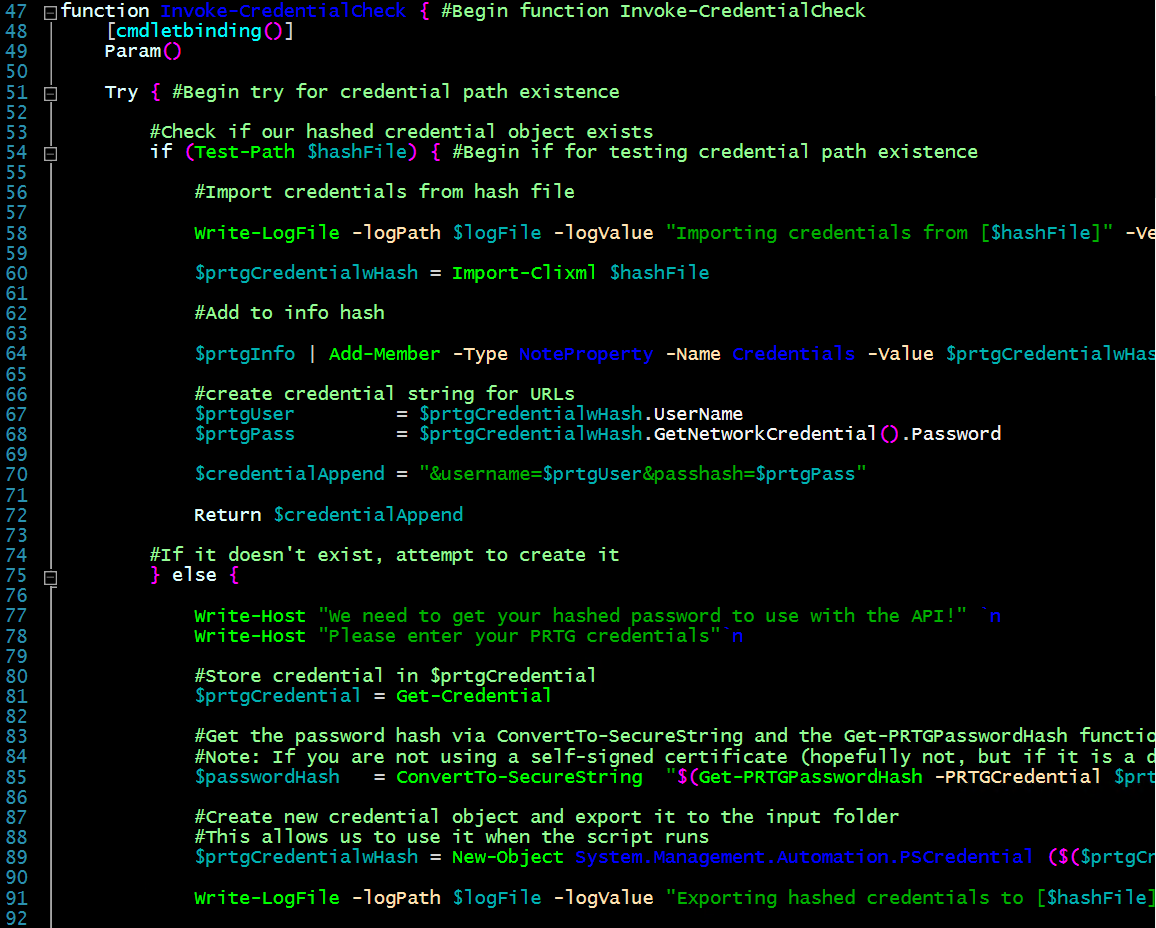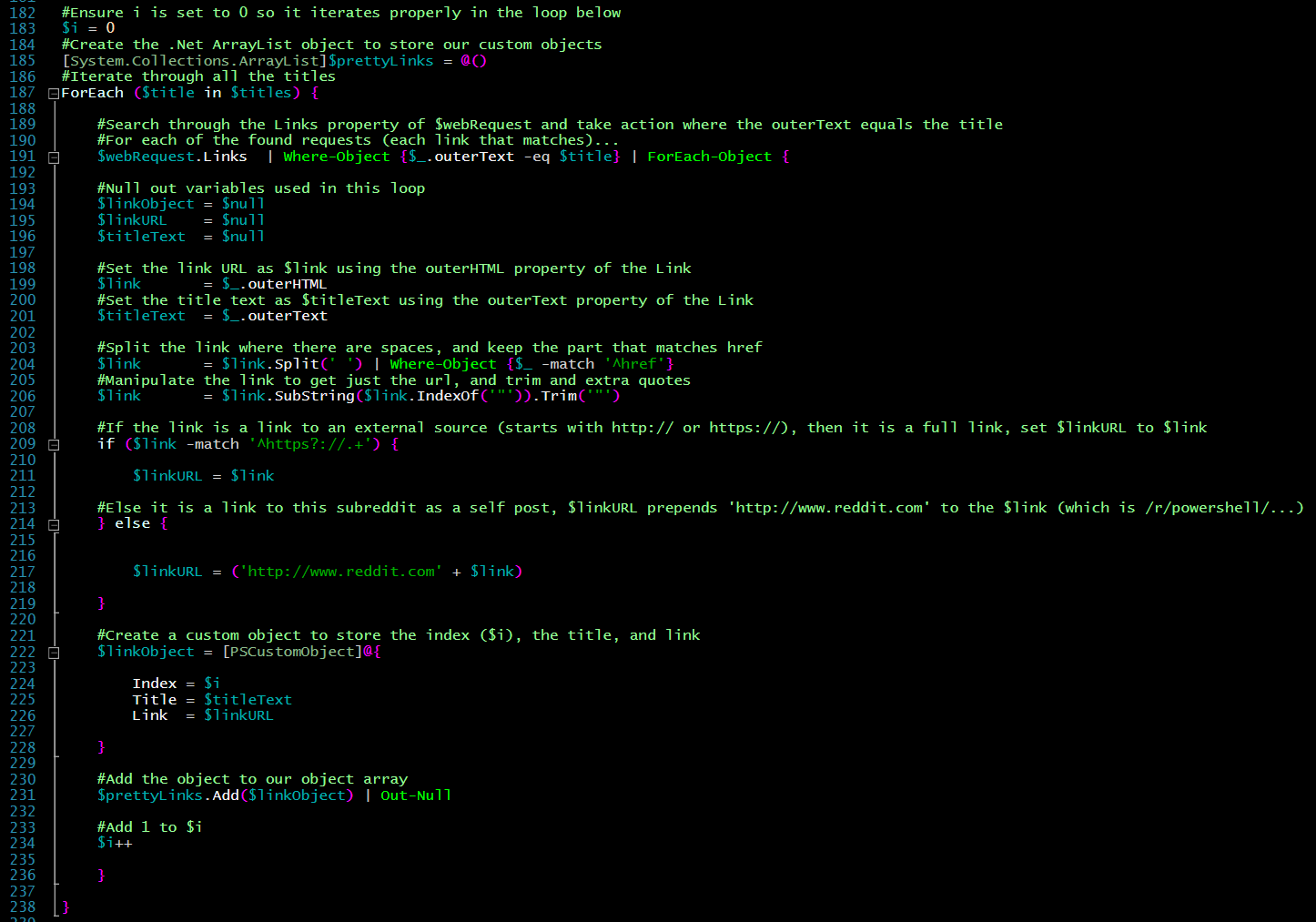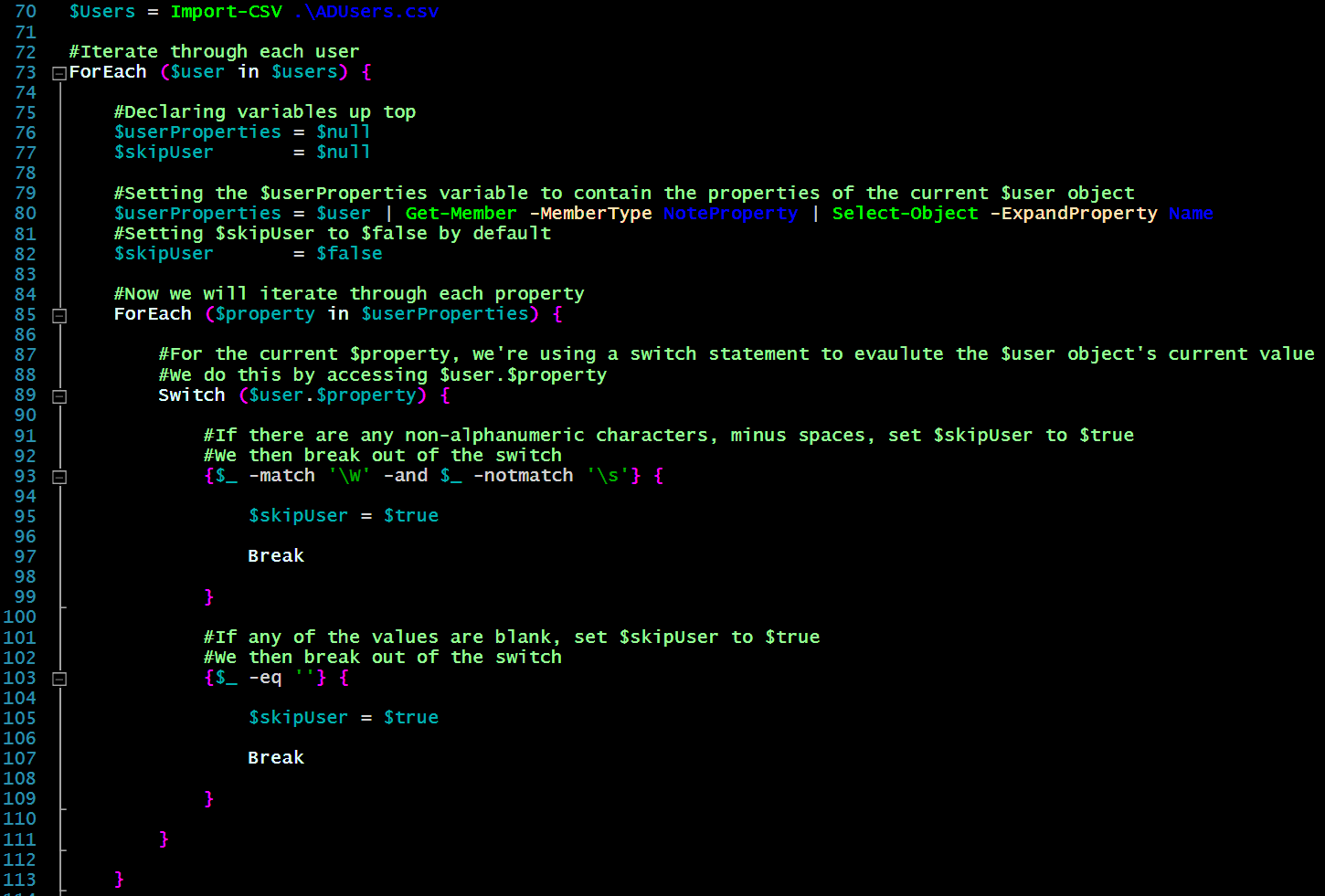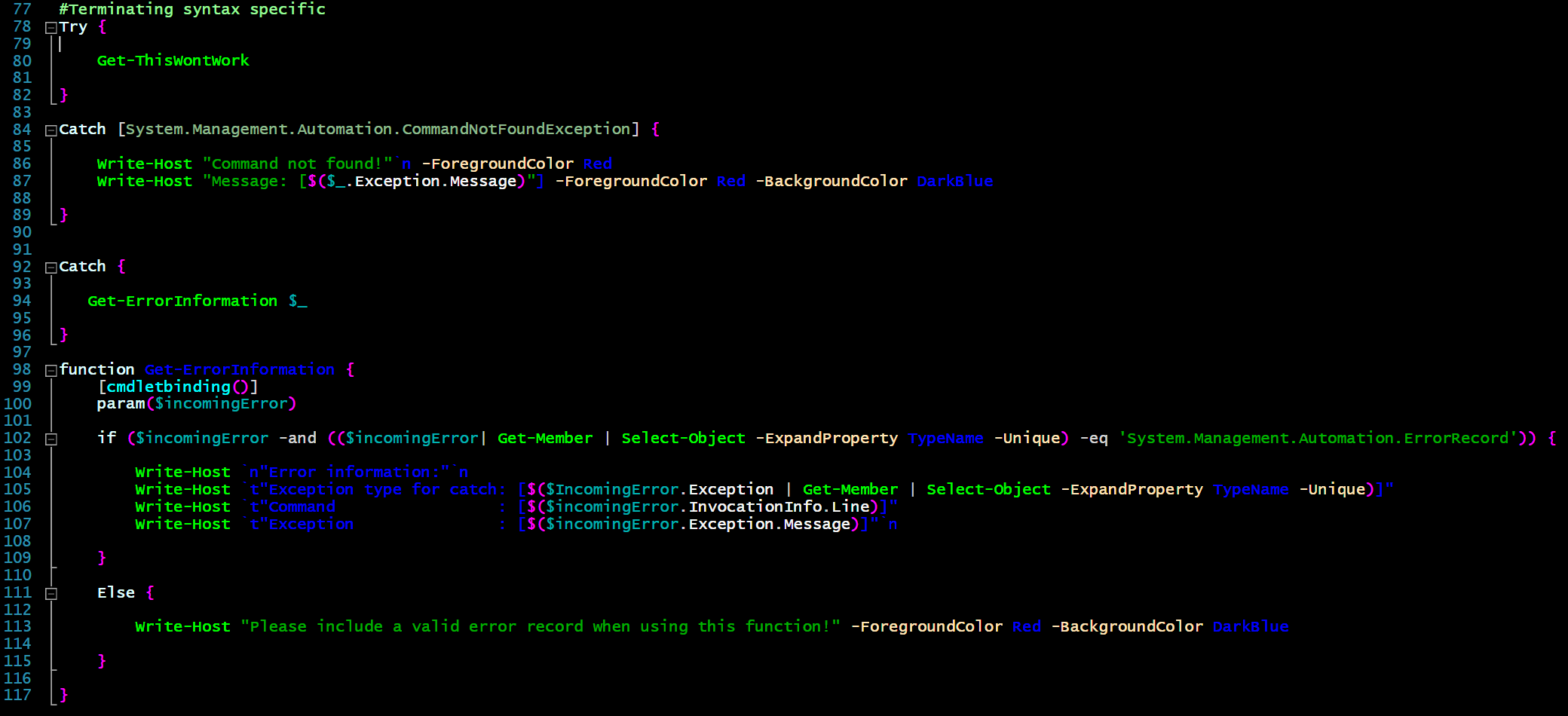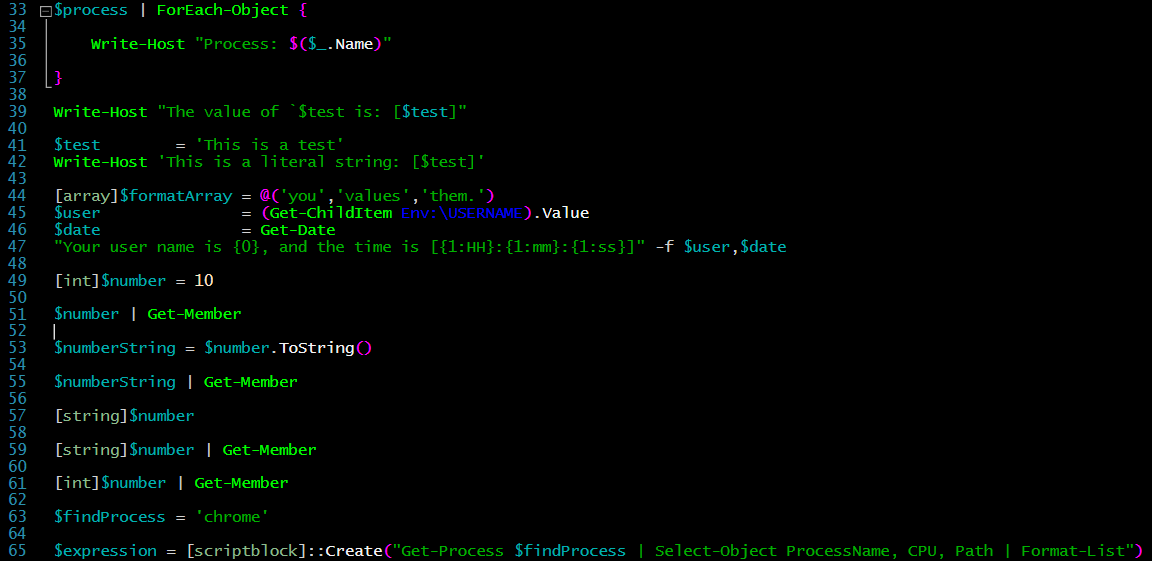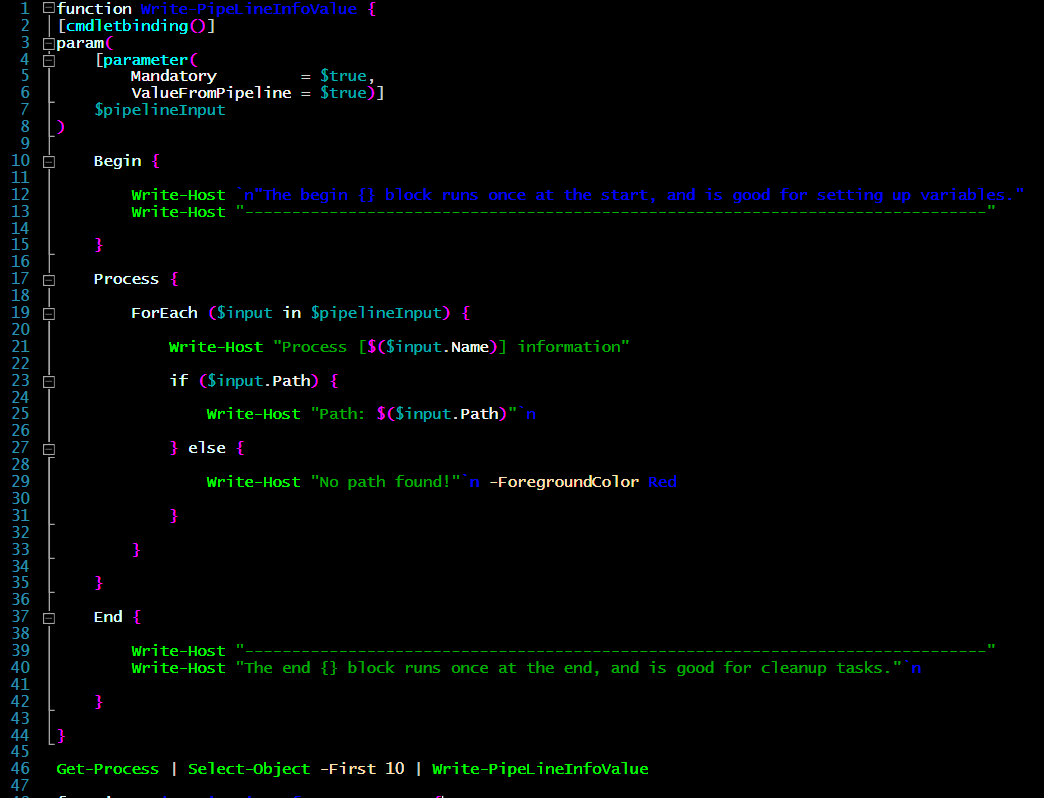Set-StrictMode -Version Latest
$scriptPath = Split-Path -Parent -Path $MyInvocation.MyCommand.Definition
Switch ($MyInvocation.PSCommandPath) {
{$_ -match '\\\\'} {
$scriptName = $_.SubString($_.LastIndexOf('\')+1)
}
Default {
$scriptName = Get-ChildItem $MyInvocation.PSCommandPath | Select-Object -ExpandProperty BaseName
}
}
if ('Count' -in ($scriptName.psobject.Members.Name)) {
$scriptName = 'ScriptLog'
}
function New-LogFile {
<#
.SYNOPSIS
New-LogFile will create a log file.
.DESCRIPTION
New-LogFile will create a log file.
You can specify different paramaters to change the file's name, and where it is stored.
By default it will attempt to get the name of the calling function or script via $scriptName = (Get-ChildItem $MyInvocation.PSCommandPath | Select-Object -ExpandProperty BaseName).
It will also attempt to get the path via $scriptPath = Split-Path -Parent -Path $MyInvocation.MyCommand.Definition.
You can also specify the path and name, as well as if you'd like to append the date in the following format: MM-dd-yy_HHmm.
Use the -Verbose parameter to display what is happening to the host.
.PARAMETER logPath
Alias: Path
Type : String
Specify the path to the logfile
.PARAMETER logName
Alias: Name
Type : String
Specify the name of the log file. Be sure to include the extension if specifying the name.
.PARAMETER scriptVersion
Type : Double
Specify the version of your script being run. If left blank, will default to 0.1
.PARAMETER addDate
Type : Boolean
Specify if you'd like to add the date to the file name. If you're specifying logName, you can use addDate to append the current date/time in the format: MM-dd-yy_HHmm.
.NOTES
Name: New-LogFile
Version: 1.0
Author: Ginger Ninja (Mike Roberts)
DateCreated: 5/11/16
.LINK
http://www.gngrninja.com
.EXAMPLE
$logFile = New-LogFile
-----------------------------
gngrNinja> $logFile
C:\PowerShell\logs\ScriptLog_05-11-16_1612.log
.EXAMPLE
$logFile = New-LogFile -Verbose
-----------------------------
VERBOSE: No path specified. Using: C:\PowerShell\logs
VERBOSE:
VERBOSE: No log name specified. Setting log name to: ScriptLog.log and adding date.
VERBOSE:
VERBOSE: Adding date to log file with an extension! New file name:
ScriptLog_05-11-16_1613.log
VERBOSE:
VERBOSE: Created C:\PowerShell\logs\ScriptLog_05-11-16_1613.log
VERBOSE:
VERBOSE: File C:\PowerShell\logs\ScriptLog_05-11-16_1613.log created and verified to
exist.
VERBOSE:
VERBOSE: Adding the following information to:
C:\PowerShell\logs\ScriptLog_05-11-16_1613.log
VERBOSE:
VERBOSE: -----------------------------------------------------------------
VERBOSE: Started logging at [05/11/2016 16:13:11]
VERBOSE: Script (Version 0.1) executed by: [thegn] on computer: [GINJA10]
VERBOSE: -----------------------------------------------------------------
VERBOSE:
gngrNinja>
.EXAMPLE
$logfile = New-LogFile -Name 'testName.log' -path 'c:\temp' -addDate $true -Verbose
-----------------------------
VERBOSE: Adding date to log file with an extension! New file name:
testName_05-11-16_1615.log
VERBOSE:
VERBOSE: Created c:\temp\testName_05-11-16_1615.log
VERBOSE:
VERBOSE: File C:\temp\testName_05-11-16_1615.log created and verified to exist.
VERBOSE:
VERBOSE: Adding the following information to: C:\temp\testName_05-11-16_1615.log
VERBOSE:
VERBOSE: -----------------------------------------------------------------
VERBOSE: Started logging at [05/11/2016 16:15:13]
VERBOSE: Script (Version 0.1) executed by: [thegn] on computer: [GINJA10]
VERBOSE: -----------------------------------------------------------------
VERBOSE:
.OUTPUTS
Full path to the log file created.
#>
[cmdletbinding()]
param(
[Parameter(Mandatory = $false,
Position = 0)]
[Alias('Path')]
[string]
$logPath,
[Parameter(Mandatory = $false,
Position = 1)]
[Alias('Name')]
[string]
$logName,
[Parameter(Mandatory = $false,
Position = 2)]
[double]
$scriptVersion = 0.1,
[Parameter(Mandatory = $false,
Position = 3)]
[boolean]
$addDate = $false
)
#Check if file/path are set
if (!$logPath) {
$logPath = "$scriptPath\logs"
Write-Verbose "No path specified. Using: $logPath"
Write-Verbose ""
}
if (!$logName) {
$logName = $scriptName + '.log'
$addDate = $true
Write-Verbose "No log name specified. Setting log name to: $logName and adding date."
Write-Verbose ""
}
#Check if $addDate is $true, take action if so
if ($addDate) {
if ($logName.Contains('.')) {
$logName = $logName.SubString(0,$logName.LastIndexOf('.')) + "_{0:MM-dd-yy_HHmm}" -f (Get-Date) + $logName.Substring($logName.LastIndexOf('.'))
Write-Verbose "Adding date to log file with an extension! New file name: $logName"
Write-Verbose ""
} else {
$logName = $logName + "_{0:MM-dd-yy_HHmm}" -f (Get-Date)
Write-Verbose "Adding date to log file. New file name: $logName"
Write-Verbose ""
}
}
#Variable set up
$time = Get-Date
$fullPath = $logPath + '\' + $logName
$curUser = (Get-ChildItem Env:\USERNAME).Value
$curComp = (Get-ChildItem Env:\COMPUTERNAME).Value
#Checking paths / Creating directory if needed
if (!(Test-Path $logPath)) {
Try {
New-Item -Path $logPath -ItemType Directory -ErrorAction Stop | Out-Null
Write-Verbose "Folder $logPath created as it did not exist."
Write-Verbose ""
}
Catch {
$message = $_.Exception.Message
Write-Output "Could not create folder due to an error. Aborting. (See error details below)"
Write-Error $message
Break
}
}
#Checking to see if a file with the name name exists, renaming it if so.
if (Test-Path $fullPath) {
Try {
$renFileName = ($fullPath + (Get-Random -Minimum ($time.Second) -Maximum 999) + 'old')
Rename-Item $fullPath -NewName ($renFileName.Substring($renFileName.LastIndexOf('\')+1)) -Force -ErrorAction Stop | Out-Null
Write-Verbose "Renamed $fullPath to $($renFileName.Substring($renFileName.LastIndexOf('\')+1))"
Write-Verbose ""
}
Catch {
$message = $_.Excetion.Message
Write-Output "Could not rename existing file due to an error. Aborting. (See error details below)"
Write-Error $message
Break
}
}
#File creation
Try {
New-Item -Path $fullPath -ItemType File -ErrorAction Stop | Out-Null
Write-Verbose "Created $fullPath"
Write-Verbose ""
}
Catch {
$message = $_.Exception.Message
Write-Output "Could not create directory due to an error. Aborting. (See error details below)"
Write-Error $message
Break
}
#Get the full path in case of dot sourcing
$fullPath = (Get-ChildItem $fullPath).FullName
if (Test-Path $fullPath) {
$flairLength = ("Script (Version $scriptVersion) executed by: [$curUser] on computer: [$curComp]").Length + 1
Write-Verbose "File $fullPath created and verified to exist."
Write-Verbose ""
Write-Verbose "Adding the following information to: $fullPath"
Write-Verbose ""
Write-Verbose ('-'*$flairLength)
Write-Verbose "Started logging at [$time]"
Write-Verbose "Script (Version $scriptVersion) executed by: [$curUser] on computer: [$curComp]"
Write-Verbose ('-'*$flairLength)
Write-Verbose ""
Add-Content -Path $fullPath -Value ('-'*$flairLength)
Add-Content -Path $fullPath -Value "Started logging at [$time]"
Add-Content -Path $fullPath -Value "Script (Version $scriptVersion) executed by: [$curUser] on computer: [$curComp]"
Add-Content -Path $fullPath -Value ('-'*$flairLength)
Add-Content -Path $fullPath -Value ""
Return [string]$fullPath
} else {
Write-Error "File $fullPath does not exist. Aborting script."
Break
}
}
function Write-LogFile {
<#
.SYNOPSIS
Write-LogFile will add information to a log file created with New-LogFile.
.DESCRIPTION
Write-LogFile will add information to a log file created with New-LogFile.
By default additions to the log file will include a timestamp, unless you specify -addTimeStamp $false.
This function accepts values from the pipeline, as demonstrated in an example.
Use the -Verbose parameter to display what is being logged to the host.
.PARAMETER logPath
Alias: Path
Type : String
Specify the full path to the log file, including the name.
.PARAMETER logValue
Alias: Value
Type : String
Specify the value(s) you'd like logged.
.PARAMETER addTimeStamp
Type : Boolean
Defaults to true, set to false if you'd like to omit the timestamp.
.NOTES
Name: Write-LogFile
Version: 1.0
Author: Ginger Ninja (Mike Roberts)
DateCreated: 5/11/16
.LINK
http://www.gngrninja.com
.EXAMPLE
For this example we'll assume you use:
$logFile = New-LogFile
Write-LogFile -logPath $logFile -logValue 'test log value!'
-----------------------------
gngrNinja> more $logfile
-----------------------------------------------------------------
Started logging at [05/11/2016 16:19:37]
Script (Version 0.1) executed by: [thegn] on computer: [GINJA10]
-----------------------------------------------------------------
[05-11-16 16:23:24] test log value!
.EXAMPLE
For this example we'll assume you use:
$logFile = New-LogFile
Write-LogFile -logPath $logFile -logValue 'test log value!' -Verbose
-----------------------------
VERBOSE: Adding [05-11-16 16:25:19] test log value! to
C:\PowerShell\logs\ScriptLog_05-11-16_1619.log
VERBOSE:
.EXAMPLE
For this example we'll assume you use:
$logFile = New-LogFile
Get-Process | Write-LogFile $logFile -Verbose
-----------------------------
...
VERBOSE: Adding [05-11-16 16:26:51] System.Diagnostics.Process (wininit) to
C:\PowerShell\logs\ScriptLog_05-11-16_1619.log
VERBOSE:
VERBOSE: Adding [05-11-16 16:26:51] System.Diagnostics.Process (winlogon) to
C:\PowerShell\logs\ScriptLog_05-11-16_1619.log
VERBOSE:
VERBOSE: Adding [05-11-16 16:26:51] System.Diagnostics.Process (WmiPrvSE) to
C:\PowerShell\logs\ScriptLog_05-11-16_1619.log
VERBOSE:
VERBOSE: Adding [05-11-16 16:26:51] System.Diagnostics.Process (WmiPrvSE) to
C:\PowerShell\logs\ScriptLog_05-11-16_1619.log
VERBOSE:
VERBOSE: Adding [05-11-16 16:26:51] System.Diagnostics.Process (WUDFHost) to
C:\PowerShell\logs\ScriptLog_05-11-16_1619.log
VERBOSE:
...
.EXAMPLE
For this example we'll assume you use:
$logFile = New-LogFile
Write-LogFile -logPath $logFile -logValue 'test without timestamp' -addTimeStamp $false -Verbose
-----------------------------
VERBOSE: Adding test without timestamp to C:\PowerShell\logs\ScriptLog_05-11-16_1631.log
VERBOSE:
#>
[cmdletbinding()]
param(
[Parameter(Mandatory = $true,
Position = 0)]
[Alias('Path')]
[string]
$logPath,
[Parameter(Mandatory = $true,
ValueFromPipeline = $true,
ValueFromPipelineByPropertyName = $true,
Position = 1)]
[Alias('Value')]
[string]
$logValue,
[Parameter(Mandatory = $false,
Position = 2)]
[boolean]
$addTimeStamp = $true
)
Begin {
if (!(Test-Path $logPath)) {
Write-Error "Unable to access $logPath"
Break
}
}
Process {
ForEach ($value in $logValue) {
$timeStamp = "[{0,0:MM}-{0,0:dd}-{0,0:yy} {0,0:HH}:{0,0:mm}:{0,0:ss}]" -f (Get-Date)
if ($addTimeStamp) {
$value = "$($timeStamp + ' ' + $value)"
}
Write-Verbose "Adding $value to $logPath"
Write-Verbose ""
Add-Content -Path $logPath -Value $value
Add-Content -Path $logPath -Value ''
}
}
}
function Write-LogFileError {
<#
.SYNOPSIS
Write-LogFileError will add information to a log file created with New-LogFile. The information will be prepended with [ERROR].
.DESCRIPTION
Write-LogFileError will add information to a log file created with New-LogFile. The information will be prepended with [ERROR].
By default additions to the log file will include a timestamp, unless you specify -addTimeStamp $false.
This function accepts values from the pipeline, as demonstrated in an example.
Use the -Verbose parameter to display what is being logged to the host.
.PARAMETER logPath
Alias: Path
Type : String
Specify the full path to the log file, including the name.
.PARAMETER errorDesc
Alias: Value
Type : String
Specify the value(s) you'd like logged as errors.
.PARAMETER addTimeStamp
Type : Boolean
Defaults to true, set to false if you'd like to omit the timestamp.
.PARAMETER exitScript
Alias: Exit
Type : Boolean
This parameter let's you specify $true if you'd like to exit the script after the error is logged.
It defaults to $false.
.NOTES
Name: Write-LogFileError
Version: 1.0
Author: Ginger Ninja (Mike Roberts)
DateCreated: 5/11/16
.LINK
http://www.gngrninja.com
.EXAMPLE
For this example we'll assume you use:
$logFile = New-LogFile
Write-LogFileError -logPath $logFile -errorDesc 'test log value error!'
-----------------------------
gngrNinja> more $logFile
-----------------------------------------------------------------
Started logging at [05/11/2016 16:31:44]
Script (Version 0.1) executed by: [thegn] on computer: [GINJA10]
-----------------------------------------------------------------
[05-11-16 16:31:51] [ERROR ENCOUNTERED]: test log value error!
#>
[CmdletBinding()]
param(
[Parameter(Mandatory = $true,
Position = 0)]
[Alias('Path')]
[string]
$logPath,
[Parameter(Mandatory = $true,
ValueFromPipeline = $true,
ValueFromPipelineByPropertyName = $true,
Position = 1)]
[string]
$errorDesc,
[Parameter(Mandatory = $false,
Position = 2)]
[boolean]
$addTimeStamp = $true,
[Parameter(Mandatory = $false,
Position = 3)]
[Alias('Exit')]
[boolean]
$exitScript = $false
)
Begin {
if (!(Test-Path $logPath)) {
Write-Error "Unable to access $logPath"
Break
}
}
Process {
ForEach ($value in $errorDesc) {
$timeStamp = "[{0,0:MM}-{0,0:dd}-{0,0:yy} {0,0:HH}:{0,0:mm}:{0,0:ss}]" -f (Get-Date)
$value = "[ERROR ENCOUNTERED]: $value"
if ($addTimeStamp) {
$value = "$($timeStamp + ' ' + $value)"
}
Write-Verbose "Adding $value to $logPath"
Write-Verbose ""
Add-Content -Path $logPath -Value $value
Add-Content -Path $logPath -Value ''
}
}
End {
if ($exitScript) {
Write-Verbose "Performing log file close command: Resolve-LogFile -logPath $logPath -exitonCompletion $true"
Write-Verbose ""
Resolve-LogFile -logPath $logPath -exitScript $true
}
}
}
function Write-LogFileWarning {
<#
.SYNOPSIS
Write-LogFileWarning will add information to a log file created with New-LogFile. The information will be prepended with [ERROR].
.DESCRIPTION
Write-LogFileWarning will add information to a log file created with New-LogFile. The information will be prepended with [ERROR].
By default additions to the log file will include a timestamp, unless you specify -addTimeStamp $false.
This function accepts values from the pipeline, as demonstrated in an example.
Use the -Verbose parameter to display what is being logged to the host.
.PARAMETER logPath
Alias: Path
Type : String
Specify the full path to the log file, including the name.
.PARAMETER warningDesc
Alias: Value
Type : String
Specify the value(s) you'd like logged as errors.
.PARAMETER addTimeStamp
Type : Boolean
Defaults to true, set to false if you'd like to omit the timestamp.
.PARAMETER exitScript
Alias: Exit
Type : Boolean
This parameter let's you specify $true if you'd like to exit the script after the error is logged.
It defaults to $false.
.NOTES
Name: Write-LogFileWarning
Version: 1.0
Author: Ginger Ninja (Mike Roberts)
DateCreated: 5/11/16
.LINK
http://www.gngrninja.com
.EXAMPLE
For this example we'll assume you use:
$logFile = New-LogFile
Write-LogFileWarning -logPath $logFile -warningDesc 'test log value warning!'
-----------------------------
gngrNinja> more $logFile
-----------------------------------------------------------------
Started logging at [05/11/2016 16:38:29]
Script (Version 0.1) executed by: [thegn] on computer: [GINJA10]
-----------------------------------------------------------------
[05-11-16 16:38:48] [WARNING]: test log value warning!
#>
[CmdletBinding()]
param(
[Parameter(Mandatory = $true,
Position = 0)]
[Alias('Path')]
[string]
$logPath,
[Parameter(Mandatory = $true,
ValueFromPipeline = $true,
ValueFromPipelineByPropertyName = $true,
Position = 1)]
[string]
$warningDesc,
[Parameter(Mandatory = $false,
Position = 2)]
[boolean]
$addTimeStamp = $true,
[Parameter(Mandatory = $false,
Position = 3)]
[Alias('Exit')]
[boolean]
$exitScript = $false
)
Begin {
if (!(Test-Path $logPath)) {
Write-Error "Unable to access $logPath"
Break
}
}
Process {
ForEach ($value in $warningDesc) {
$timeStamp = "[{0,0:MM}-{0,0:dd}-{0,0:yy} {0,0:HH}:{0,0:mm}:{0,0:ss}]" -f (Get-Date)
$value = "[WARNING]: $value"
if ($addTimeStamp) {
$value = "$($timeStamp + ' ' + $value)"
}
Write-Verbose "Adding $value to $logPath"
Write-Verbose ""
Add-Content -Path $logPath -Value $value
Add-Content -Path $logPath -Value ''
}
}
End {
if ($exitScript) {
Write-Verbose "Performing log file close command: Resolve-LogFile -logPath $logPath -exitonCompletion $true"
Write-Verbose ""
Resolve-LogFile -logPath $logPath -exitScript $true
}
}
}
function Resolve-LogFile {
<#
.SYNOPSIS
Resolve-LogFile will resolve a created log file.
.DESCRIPTION
Resolve-LogFile will resolve a created log file.
Use the -Verbose parameter to display what is happening to the host.
.PARAMETER logPath
Alias: Path
Type : String
Specify the full path, including name, to the log file to be resolved.
.PARAMETER logName
Alias: Name
Type : String
Specify the name of the log file. Be sure to include the extension if specifying the name.
.PARAMETER exitScript
Alias: Exit
Type : Boolean
Specify $true if you'd like to exit the script after the log file is resolved.
It defaults to $false.
.NOTES
Name: Resolve-LogFile
Version: 1.0
Author: Ginger Ninja (Mike Roberts)
DateCreated: 5/11/16
.LINK
http://www.gngrninja.com
.EXAMPLE
$logFile = New-LogFile
-----------------------------
gngrNinja> $logFile
C:\PowerShell\logs\ScriptLog_05-11-16_1612.log
.EXAMPLE
$logFile = New-LogFile
Get-Process | Write-LogFile $logFile
Resolve-LogFile $logFile
-----------------------------
...
[05-11-16 16:43:58] System.Diagnostics.Process (wininit)
[05-11-16 16:43:58] System.Diagnostics.Process (winlogon)
[05-11-16 16:43:58] System.Diagnostics.Process (WmiPrvSE)
[05-11-16 16:43:58] System.Diagnostics.Process (WmiPrvSE)
[05-11-16 16:43:58] System.Diagnostics.Process (WUDFHost)
---------------------------------------------
Ended logging at [05/11/2016 16:44:01]
---------------------------------------------
#>
[cmdletbinding()]
param(
[parameter(Mandatory = $true,
Position = 0)]
[Alias('Path')]
[string]
$logPath,
[Parameter(Mandatory = $false,
Position = 1)]
[Alias('Exit')]
[boolean]
$exitScript = $false
)
$time = Get-Date
if (Test-Path $logPath) {
$flairLength = ("Finished processing at [$time]").Length + 1
Write-Verbose "Adding the following content to: $logPath"
Write-Verbose ('-'*$flairLength)
Write-Verbose "Ended logging at [$time]"
Write-Verbose ('-'*$flairLength)
Write-Verbose ""
Add-Content -Path $logPath -Value ('-'*$flairLength)
Add-Content -Path $logPath -Value "Ended logging at [$time]"
Add-Content -Path $logPath -Value ('-'*$flairLength)
} else {
Write-Error "Unable to access $logPath"
Break
}
if ($exitScript) {
Write-Verbose "Exiting on completion specified, exiting..."
Exit
}
}
function Out-LogFile {
<#
.SYNOPSIS
Out-LogFile will create, add to, and resolve a logfile.
.DESCRIPTION
Out-LogFile will create, add to, and resolve a logfile.
Value from the pipeline is accepted.
Use the -Verbose parameter to display what is happening to the host.
.PARAMETER logPath
Alias: Path
Type : String
Specify the path to the logFile you'd like created.
.PARAMETER logName
Alias: Name
Type : String
Specify the name of the log file. Be sure to include the extension if specifying the name.
.PARAMETER logValue
Alias: Value
Type : String
Specify the value(s) you'd like logged.
.PARAMETER addTimeStamp
Type : Boolean
Defaults to true, set to false if you'd like to omit the timestamp.
.NOTES
Name: Out-LogFile
Version: 1.0
Author: Ginger Ninja (Mike Roberts)
DateCreated: 5/11/16
.LINK
http://www.gngrninja.com
.EXAMPLE
$outLog = Get-Process | Out-LogFile -logPath c:\temp -logName 'outlog.log' -Verbose
-----------------------------
VERBOSE: Created c:\temp\outlog.log
VERBOSE:
VERBOSE: File C:\temp\outlog.log created and verified to exist.
VERBOSE:
VERBOSE: Adding the following information to: C:\temp\outlog.log
VERBOSE:
VERBOSE: -----------------------------------------------------------------
VERBOSE: Started logging at [05/11/2016 16:58:43]
VERBOSE: Script (Version 0.1) executed by: [thegn] on computer: [GINJA10]
VERBOSE: -----------------------------------------------------------------
VERBOSE:
VERBOSE: Adding [05-11-16 16:58:43] System.Diagnostics.Process (AdobeUpdateService) to
C:\temp\outlog.log
VERBOSE:
.EXAMPLE
$outLog = Get-Process | Out-LogFile -Verbose
-----------------------------
gngrNinja> more $outLog
...
[05-11-16 16:56:02] System.Diagnostics.Process (winlogon)
[05-11-16 16:56:02] System.Diagnostics.Process (WmiPrvSE)
[05-11-16 16:56:02] System.Diagnostics.Process (WmiPrvSE)
[05-11-16 16:56:02] System.Diagnostics.Process (WUDFHost)
---------------------------------------------
Ended logging at [05/11/2016 16:56:02]
---------------------------------------------
gngrNinja>
#>
[cmdletbinding()]
param(
[Parameter(Mandatory = $false,
Position = 0)]
[Alias('Path')]
[string]
$logPath,
[Parameter(Mandatory = $false,
Position = 1)]
[Alias('Name')]
[string]
$logName,
[Parameter(Mandatory = $true,
ValueFromPipeLine = $true,
ValueFromPipelineByPropertyName = $true,
Position = 2)]
[Alias('Value')]
[string]
$logValue,
[Parameter(Mandatory = $false,
Position = 3)]
[boolean]
$addTimeStamp = $true
)
Begin {
$logFile = New-LogFile -logPath $logPath -logName $logName
}
Process {
ForEach ($value in $logValue) {
Write-LogFile -logPath $logFile -logValue $value -addTimeStamp $addTimeStamp
}
}
End {
Resolve-LogFile $logFile
Return $logFile
}
}
function Send-LogEmail {
[cmdletbinding()]
param(
[Parameter(Mandatory=$true)]
[string]
$To,
[Parameter(Mandatory=$true)]
[string]
$Subject,
[Parameter(Mandatory=$true)]
[string]
$Body,
[Parameter(Mandatory=$true)]
[string]
$emailFrom,
[Parameter(Mandatory=$true)]
[string]
$emailUser,
[Parameter(Mandatory=$false)]
[string]
$provider = 'gmail',
[Parameter(Mandatory=$true)]
$password = (Read-Host "Password?" -AsSecureString)
)
if (!$to) {Write-Error "No recipient specified";break}
if (!$subject) {Write-Error "No subject specified";break}
if (!$body) {Write-Error "No body specified";break}
if (!$emailFrom) {$emailFrom = 'Ninja_PS_Logging@gngrninja.com'}
Switch ($provider) {
{$_ -eq 'gmail'} {
$SMTPServer = "smtp.gmail.com"
$SMTPPort = 587
}
{$_ -eq 'custom'} {
$SMTPServer = 'Your.SMTP.Server'
$SMTPPort = 'Your.SMTP.Server.Port'
}
}
$gmailCredential = New-Object System.Management.Automation.PSCredential($emailUser,$password)
Send-MailMessage -To $to -From $emailFrom -Body $body -BodyAsHtml:$true -Subject $Subject -SmtpServer $smtpServer -Port $smtpPort -UseSsl -Credential $gmailCredential
}
























